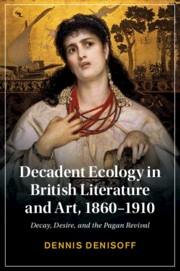Book contents
- Decadent Ecology In British Literature And Art, 1860–1910
- Cambridge Studies in Nineteenth-Century Literature and Culture
- Decadent Ecology In British Literature And Art, 1860–1910
- Copyright page
- Contents
- Figures
- Acknowledgments
- Introduction
- Chapter 1 Decadent Ecology and the Pagan Revival
- Chapter 2 “Up & down & horribly natural”
- Chapter 3 The Lick of Love
- Chapter 4 The Genius Loci as Spirited Vagabond in Robert Louis Stevenson and Vernon Lee
- Chapter 5 Occult Ecology and the Decadent Feminism of Moina Mathers and Florence Farr
- Chapter 6 Sinking Feeling
- Epilogue
- Notes
- Index
- Cambridge Studies in Nineteenth-Century Literature and Culture
Chapter 4 - The Genius Loci as Spirited Vagabond in Robert Louis Stevenson and Vernon Lee
Published online by Cambridge University Press: 09 December 2021
- Decadent Ecology In British Literature And Art, 1860–1910
- Cambridge Studies in Nineteenth-Century Literature and Culture
- Decadent Ecology In British Literature And Art, 1860–1910
- Copyright page
- Contents
- Figures
- Acknowledgments
- Introduction
- Chapter 1 Decadent Ecology and the Pagan Revival
- Chapter 2 “Up & down & horribly natural”
- Chapter 3 The Lick of Love
- Chapter 4 The Genius Loci as Spirited Vagabond in Robert Louis Stevenson and Vernon Lee
- Chapter 5 Occult Ecology and the Decadent Feminism of Moina Mathers and Florence Farr
- Chapter 6 Sinking Feeling
- Epilogue
- Notes
- Index
- Cambridge Studies in Nineteenth-Century Literature and Culture
Summary
Decadence turned to paganism to grasp not only animal intimacies but also engagements with the environment more generally. Building on the queer trans-species intimacies articulated by Swinburne, Pater, Solomon, and Field, Chapter 4 addresses Robert Louis Stevenson’s and Vernon Lee’s renderings of the environment as genius loci. As I argue, for Stevenson and Lee the genii locorum are not fixed locations in nature but ecological entanglements among animal and vegetal species, geographic formations, and climate. Stevenson and Lee extend Pater’s ecological correspondences by presenting the immersive experiences of the peripatetic as sensual and psychological engagements with nature that result in a more vital identification outside the self. And in situating their analyses within the growing cultural practice of the nature walk, their writings redefine the genius loci as a dynamic engagement suggestive of early environmentalism.
- Type
- Chapter
- Information
- Decadent Ecology in British Literature and Art, 1860–1910Decay, Desire, and the Pagan Revival, pp. 96 - 139Publisher: Cambridge University PressPrint publication year: 2021

